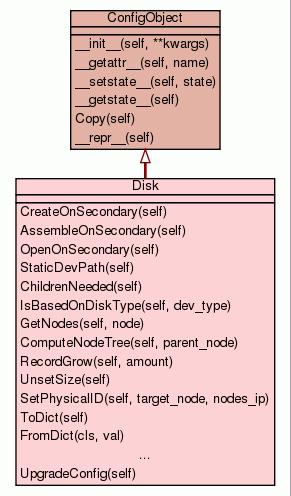
| Trees | Indices | Help |
|
|---|
|
|

Config object representing a block device.
|
|||
|
|||
|
|||
|
|||
|
|||
|
|||
| boolean |
|
||
|
|||
|
|||
|
|||
|
|||
|
|||
|
|||
|
|||
|
|||
|
|||
|
Inherited from Inherited from |
|||
|
|||
|
|||
|
Inherited from |
|||
|
|||
|
Inherited from |
|||
|
|||
|
Inherited from |
|||
|
|||
Return the device path if this device type has a static one. Some devices (LVM for example) live always at the same /dev/ path, irrespective of their status. For such devices, we return this path, for others we return None. Warning: The path returned is not a normalized pathname; callers should check that it is a valid path. |
Compute the needed number of children for activation. This method will return either -1 (all children) or a positive number denoting the minimum number of children needed for activation (only mirrored devices will usually return >=0). Currently, only DRBD8 supports diskless activation (therefore we return 0), for all other we keep the previous semantics and return -1. |
Check if the disk or its children are based on the given type.
|
This function returns the nodes this device lives on. Given the node on which the parent of the device lives on (or, in case of a top-level device, the primary node of the devices' instance), this function will return a list of nodes on which this devices needs to (or can) be assembled. |
Compute the node/disk tree for this disk and its children. This method, given the node on which the parent disk lives, will return the list of all (node, disk) pairs which describe the disk tree in the most compact way. For example, a drbd/lvm stack will be returned as (primary_node, drbd) and (secondary_node, drbd) which represents all the top-level devices on the nodes. |
Update the size of this disk after growth. This method recurses over the disks's children and updates their size correspondigly. The method needs to be kept in sync with the actual algorithms from bdev. |
Convert the logical ID to the physical ID. This is used only for drbd, which needs ip/port configuration. The routine descends down and updates its children also, because this helps when the only the top device is passed to the remote node. Arguments:
The target_node must exist in in nodes_ip, and must be one of the nodes in the logical ID for each of the DRBD devices encountered in the disk tree. |
Disk-specific conversion to standard python types. This replaces the children lists of objects with lists of standard python types.
|
Custom function for Disks
|
Custom str() formatter for disks.
|
Fill defaults for missing configuration values.
|
| Trees | Indices | Help |
|
|---|
| Generated by Epydoc 3.0.1 on Thu Dec 9 15:55:48 2010 | http://epydoc.sourceforge.net |